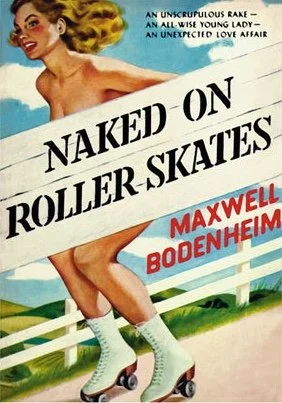Maxwell Bodenheim’s Harlem Slang
Maxwell Bodenheim is no longer the cat’s pajamas. If he was once something of a cult figure in Chicago and, later, New York City’s Greenwich Village, he is no longer of much interest to any reader – except perhaps to some stray dissertation student or to some crime reporter dredging up the gruesome details surrounding his violent death. So much for the vicissitudes of poetic fame.
Back in 1931, however, when Bodenheim was coming into his own as a literary maverick, New York publisher Horace Liveright issued his novel – Naked on Roller Skates. The title is a grabber, but the book itself would be anathema to feminists since it features a heroine who wishes to be beaten and degraded:
Listen, Terry – any man can beat up a girl’s body. That’s no trick. I want an A number one, guaranteed bastard. I want him to beat my heart and beat my brain. I want him to hurt me so I’ll get wise. I want him to lug me everywhere. all the lowest dives, the phoniest ginmills… I want him to throw me up against everybody – the crummiest woodchucks… the worst fourflushers… everybody. I want to meet the coldest women – the women who get their diamonds and cars and then start to bawl about how sad and unlucky they’ve been… I want to run into everybody just once… They say a girl can’t do it. They say she runs into a smashup every time. Well, believe me, she’ll smash up in a village cupboard too, if she can’t hide herself and settle down. That’s a lot of newspaper hokum…
Today, Bodenheim’s novel might be of interest to students of the English language because of its use of slang. Indeed, Bodenheim appends to his book a short glossary of Harlem words used in the course of the novel. I take the liberty of reprinting the glossary here, because some of the terms are far from common (chippy, hootch, and century are perhaps the more familiar) and may are not included in standard dictionaries of slang:
acecray outcray: putting the ace on the bottom of the deck, where the dealer can abstract it
bah-bah: negligible object
cake-slashing: assault and mayhem
century: hundred dollars
chippy: dissolute girl
chivvy: unpleasant odor
clip your tongue: be silent
cram the paper: cheat at cards
cut your chops: mind your own business
five hard: a fist, a punch
frill: girl, woman
glued their traps: remained silent
going to the timbers: retreating
grand: thousand dollars
grease it: pay bribe money, or blackmail
hamburger down: take it easy
hock your skin: make a difficult promise
hootch: liquor
hotsprat: trivial but agreeable entertainment
in the hole: out of money
lame your foot: deprive you of assistance
leathered: kicked unfairly
lippy chaser: a negro who prefers whites
payman, a: a cadet
pinktail: white person
scrub: face
slide them into concrete: eject them to the sidewalk
spreadeagle: to knock down
stick it: capture something
stick-stick: defeated by previous capture
stretch: jail term
three-nine: sexual variant
thumb: use the thumb to displace cards in a poker-game
trip his muscle: over-reach himself
wraps, or skins, or strips: dollars
Bodenheim adds a note: “Most of the above-listed terms are peculiar to Harlem, but some of them are used by whites in other sections.” Only a third of the terms have found their way into The Dictionary of American Slang, compiled and edited by Harold Wentworth and Stuart Berg Flexner (Thomas Y. Crowell, 1967) or Robert Chapman’s New Dictionary of American Slang (Harper & Row, 1986). Also Wentworth/Flexner and Chapman both cite the term the leather as meaning a kick, but they date the term from 1946, citing a passage from Damon Runyon: “he would give his fallen foe what we called ‘the leather,’ meaning a few boots abaft the ears…and spareribs." Bodenheim’s glossary indicates the term was popular long before 1946.
As for hamburger down, meaning to 'take it easy,’ could there be any relationship between that term and the hamburger cited by both Chpamn and Wentworth/Flexner? Hamburger means a 'prize-fighter who is badly beaten’ of a 'bum’ – both persons who are "taking it easy.” Indeed, Bodenheim’s list might be a source of enlightenment and delight to curators of American slang and is commended to their attention.
by Louis Phillips

